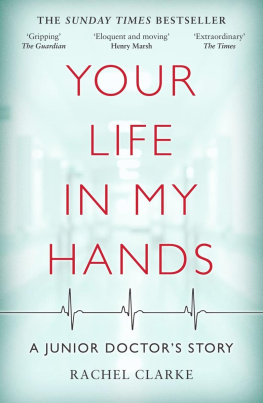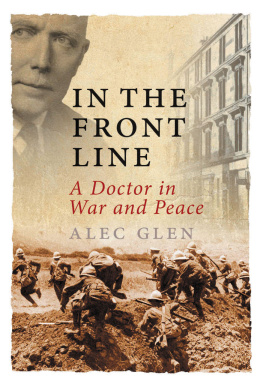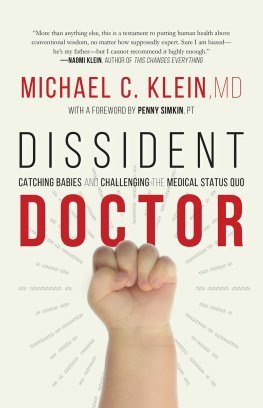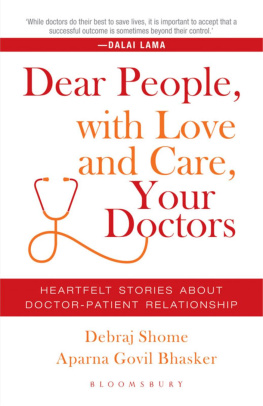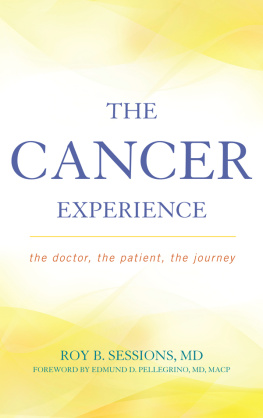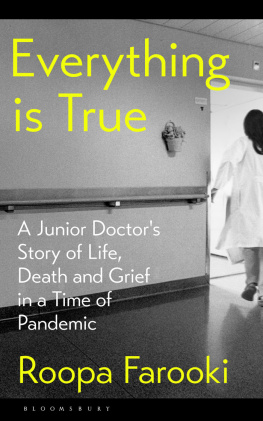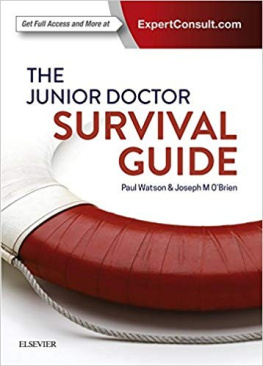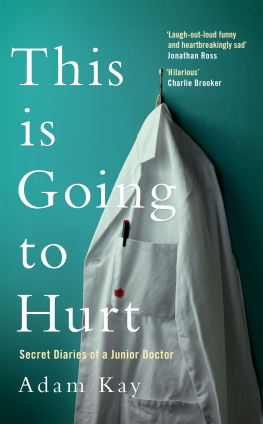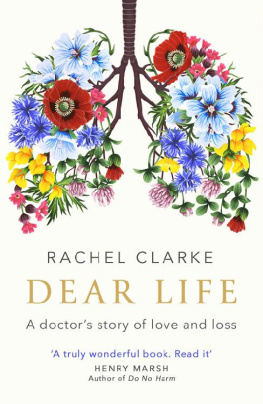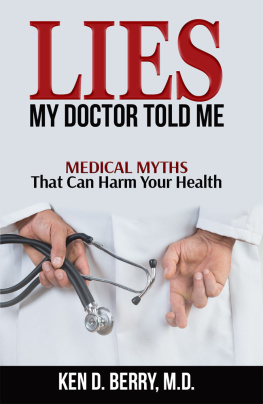A note on confidentiality. The stories told here are grounded in my clinical experience, but I have changed a great many of the details to ensure that individuals are so disguised as to be unrecognisable. Occasionally, a story may draw upon a composite of different experiences from different times, to ensure the confidentiality of any individual to whom it refers is protected.
A red dirt road steeped in ruddy dawn light and the faintest mutter of guns. The first refugees, hazy in the distance, slowly bearing down on the town. Women and children leading the retreat, bin bags and mattresses balanced upon heads, babies swaddled tight to adult hips. They crossed a faade of buildings peppered with bullet holes, impassive and mute, looking past us. My cameraman and I couldnt believe our luck. The juxtaposition of gentle morning light with the ugliness of war it was television gold, and we knew it.
Before I became a doctor, I turned peoples lives into films for a living. I was a journalist, producing and directing current-affairs documentaries like this one about the civil war in the Democratic Republic of Congo. It was 2003. The conflict, described by Prime Minister Tony Blair as a scar on the conscience of the world, had already claimed 5 million lives, most of which were civilian. Bunia, the battered town into which wed flown a few days earlier, was widely regarded as the heart of the slaughter. Rape and brutalities were commonplace. Only a month before our arrival, five hundred townsfolk had been butchered by militiamen armed with machetes. The towns makeshift, tented hospital was still filled with amputees, the youngest of whom was seven.
Even as the pace of the displaced began to quicken, and the rumble of guns grew more insistent, I couldnt resist keeping the camera rolling. The crowd began to jog and then to scatter. Bedding and possessions were dumped in the dust, children started to wail. Defeated militiamen now joined the civilians, armed with AK-47s, yet in flight and disarray. As the army from which they fled finally burst through the trees, all at once we came under their incoming fire. The air hummed with bullets. We stampeded for the only safe place in town: the United Nations peacekeepers compound with six thousand refugees already crammed behind its razor wire.
Inside the UN building, twenty or so journalists now cowered on a concrete floor as gunfire raged around us. Every grenade made the walls shake. We prayed they didnt have mortars. I was certain Id be raped, then cut to pieces. I wished I knew nothing about Bunian militiamens preferred modalities of killing. I wondered if the man from Agence France-Presse against whom I was crushed would mind if I held his hand for a moment. I longed to call my parents to tell them that I loved them. Our cameras never stopped rolling.
After four interminable hours, the gunfire finally abated. Casualties now besieged the towns rudimentary hospital. The UNs tented city had swollen by another few hundred refugees. Wed gratefully escaped our concrete bunker but, with night falling and distant guns still rumbling, we had absolutely nowhere safe to go. Every street in town was overrun with militia, so we begged the protection of UN peacekeepers guns. I lay all night on a plastic sheet beneath the compounds walls, clutching my mosquito net, too scared to close my eyes. Years later, our footage would help successfully prosecute a Congolese warlord in the UN International Criminal Court. But, at the time, filming in Bunia felt less like an achievement than an act of monumental stupidity. Id been out of my depth, flying blind.

At age twenty-nine, I left my career in television journalism to retrain as a doctor. On swapping current affairs for a caring profession, I imagined Id put war zones behind me. Yet ironically given that hospitals are meant to be citadels of healing the most frightening experience of my professional life was not those hours spent under fire in Congos killing fields but my first night on call in a UK teaching hospital. Had anyone predicted this at the time, Id have laughed at their hyperbole. But nothing, it turned out, quite matched for me the terror of being spat out of medical school into a world of blood, pain, distress and dying that I believed I must expertly navigate, while feeling wholly ill-equipped to do so.
My first set of nights loomed like a prison sentence. As a newly minted doctor, I knew twenty-eight causes of pancreatitis, the names of all two hundred and six bones in the human body, the neurophysiology of stress and fear, but not not even remotely how to make the emergency decisions that, if I got them wrong, might end up being the death of someone. No one had taught me what to do with all my knowledge. I wasnt even sure I could correctly pick out the sick patients from the ones I didnt need to worry about. And yet, in dimly lit wards across the hospital at night, several hundred patients lives were about to rest, at least initially, in my inexpert hands. I felt like a white-coated fraud.
In an effort to manage my imposter syndrome, I prepared for my nights like a military campaign. My Royal Air Force fighter-pilot husband a man for whom aerial dogfights in a Tornado F3 barely even quickened the heart rate advised me that the key, at all costs, was to stay frosty. In a forlorn effort to acquire Daves elusive inner frostiness, I retreated to what I knew: my textbooks, revising how to manage every life-or-death emergency I could possibly think of until in my head at least I was handling them all like George Clooney. I stocked up on Diet Coke, cashew nuts and moraleboosting chocolate bars. I snuck a pocket guide to emergency medicine into the bottom of my rucksack and chose sensible shoes for sprinting to crash calls. And, when I arrived at my first ever hospital handover at 9 p.m., I took custody of my on-call bleep the electronic pager through which the nurses would spend the night contacting me with what I hoped looked like battle-weary nonchalance, while secretly wanting to vomit.
The departing house officer handed me a barely legible list of jobs patients needing cannulas placed in their veins, blood tests or urinary catheters before fleeing into the night. The medical registrar, the senior doctor to whom I was meant to turn for help should I find myself out of my depth, told me in no uncertain terms that hed be busy all night in A&E, but to bleep him if I absolutely had to. The other doctors dispersed, all looking grimly competent.

